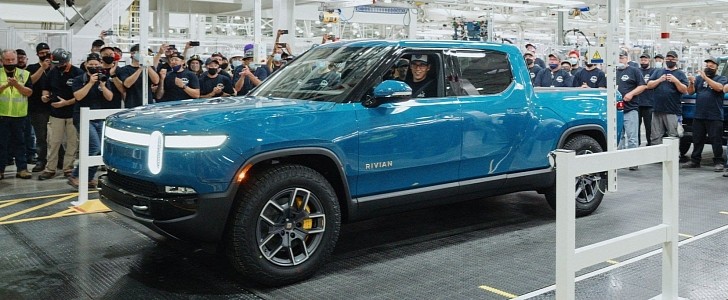It was more than expected that Rivian would have some bad news to share in its Q4 2021. The company lost $2.46 billion in the last quarter of last year alone. However, RJ Scaringe shared some exciting news about the company’s plans: Rivian is working on an 800V architecture, heat pump, bidirectional charging, and also adopting LFP cells.
If you have lost Peter Rawlinson’s video about the technical details of the Lucid Air, you missed a hell of an explanation about why high voltage is beneficial to electric cars. Although it represents a safety concern that automakers tackle as well as they can, more voltage allows for lower current. That reduces resistance, heat losses, and weight: the cables can be thinner.
With these benefits, charging can also be faster. As Rawlinson explained, not because of the batteries: they still take only 4.2V each. It is the entire electric system that takes advantage of the higher voltage to speed up charging. That shows how improved chemistries such as solid-state batteries are crucial to making EVs more practical.
That’s what LFP cells offer Rivian. They are heavier due to their lower energy density, but CTP (cell-to-pack) can make you increase that and still put batteries to work as structural elements. They offer a lower risk of thermal runaway and are also not so sensitive to dendrite formation. Above all, they are cheaper, even if their lithium content still makes them attractive for recycling when that is necessary. That may take a while…
BYD’s Blade Batteries last for 1.2 million kilometers (745,650 miles) and eight years. CATL developed a method to make batteries last 16 years or 2 million km (1.24 million miles). When such cells are no longer useful for cars, they can still have a second life as energy storage devices. In other words, anyone looking for a robust EV with the chemistries currently available will have to choose one with LFP cells.
Scaringe said that the first LFP battery pack will launch “in the commercial vehicle platform later this year, and then will make its way into our consumer vehicles by late 2023.” The Rivian CEO also said that the company is “developing in-house battery chemistries and in-house production capability.” He was pretty emphatic about this.
“When I say in-house, that's entirely in-house, not through a joint venture or through a partnership structure. But the LFP that's first launching later this year, that's a cell that we've sourced through a partner and a cell that we're going to be building in that close partnership.”
Scaringe said that Rivian is “also developing a heat pump-based thermal system,” bidirectional components, and “a bidirectional home charger and home energy products.” In other words, the company will soon offer a more efficient heating system for its cars and will make these EVs also work as moving power storage devices. Hopefully, it will test them enough to avoid the heat pump issues that Tesla is currently experiencing.
Back to the bad news, the Rivian CEO said that the Normal plant has “the ability to produce approximately 50,000 vehicles across our R1 and RCV platform in 2022.” Due to supply chain issues, this year's production output will probably be just 25,000 vehicles. Again, it was more than expected. At least Rivian had good surprises to share.
With these benefits, charging can also be faster. As Rawlinson explained, not because of the batteries: they still take only 4.2V each. It is the entire electric system that takes advantage of the higher voltage to speed up charging. That shows how improved chemistries such as solid-state batteries are crucial to making EVs more practical.
That’s what LFP cells offer Rivian. They are heavier due to their lower energy density, but CTP (cell-to-pack) can make you increase that and still put batteries to work as structural elements. They offer a lower risk of thermal runaway and are also not so sensitive to dendrite formation. Above all, they are cheaper, even if their lithium content still makes them attractive for recycling when that is necessary. That may take a while…
BYD’s Blade Batteries last for 1.2 million kilometers (745,650 miles) and eight years. CATL developed a method to make batteries last 16 years or 2 million km (1.24 million miles). When such cells are no longer useful for cars, they can still have a second life as energy storage devices. In other words, anyone looking for a robust EV with the chemistries currently available will have to choose one with LFP cells.
Scaringe said that the first LFP battery pack will launch “in the commercial vehicle platform later this year, and then will make its way into our consumer vehicles by late 2023.” The Rivian CEO also said that the company is “developing in-house battery chemistries and in-house production capability.” He was pretty emphatic about this.
“When I say in-house, that's entirely in-house, not through a joint venture or through a partnership structure. But the LFP that's first launching later this year, that's a cell that we've sourced through a partner and a cell that we're going to be building in that close partnership.”
Scaringe said that Rivian is “also developing a heat pump-based thermal system,” bidirectional components, and “a bidirectional home charger and home energy products.” In other words, the company will soon offer a more efficient heating system for its cars and will make these EVs also work as moving power storage devices. Hopefully, it will test them enough to avoid the heat pump issues that Tesla is currently experiencing.
Back to the bad news, the Rivian CEO said that the Normal plant has “the ability to produce approximately 50,000 vehicles across our R1 and RCV platform in 2022.” Due to supply chain issues, this year's production output will probably be just 25,000 vehicles. Again, it was more than expected. At least Rivian had good surprises to share.












